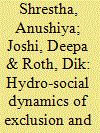|
|
|
Sort Order |
|
|
|
Items / Page
|
|
|
|
|
|
|
| Srl | Item |
| 1 |
ID:
176577


|
|
|
|
|
| Summary/Abstract |
Processes of urbanisation create peri-urban spaces that are socially and institutionally fluid. In this article, we analyse how contestations and competition over declining water resources in peri-urban Kathmandu Valley in Nepal reshape water use, access and rights as well as user communities themselves, by creating and reproducing new and existing exclusions and solidarities. Traditional caste-based discriminatory practices, prohibiting Dalits from physically accessing water from sources used by higher castes, are said to be no longer practiced in Nepal. However, our findings show that, exclusion persists for Dalits even though the characteristics of exclusion have changed. In situations of competing water claims in the research location, Dalit households, unlike higher-caste groups, are unable to exercise prior-use water rights. Their water insecurity is compounded by their relative inability to mobilise political, social and economic resources to claim and access new water services and institutions. By juxtaposing the hydro-social and social exclusion analytical frameworks, we demonstrate how exclusions as well as interpretations and experiences of water (in)security are reified in post-Maoist, supposedly inclusive Nepal.
|
|
|
|
|
|
|
|
|
|
|
|
|
|
|
|
| 2 |
ID:
169024


|
|
|
|
|
| Summary/Abstract |
Development policy and practice is replete with assumptions that local “communities” have both the willingness and capability to adapt to socio-environmental changes and become “resilient” to multiple old and new challenges. This paper analyzes socio-environmental change processes in a dynamic peri-urban context in the Kathmandu Valley of Nepal, and argues that unequal power relations between diverse actors and their differing interests refute notions of “collective action” and “community resilience.” Residents of peri-urban communities are diverse, have varying abilities and interests, and use different strategies and actions in response to complex socio-environmental changes. These differences reduce insecurities for some while reproducing inequalities for others. These interrelations at the local level are driven by wider socio-economic, political, and institutional processes that transcend community boundaries, interests, and benefits. In the face of these complexities, “community resilience” is an unviable, externally defined, and engineered goal, often at odds with the power discrepancies and heterogeneity found within actual communities. These findings suggest a need to pay attention to the social, economic, and political dynamics of socio-environmental changes that simultaneously shape local communities and their members’ abilities to respond to changes at various scales.
|
|
|
|
|
|
|
|
|
|
|
|
|
|
|
|
|
|
|
|
|